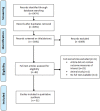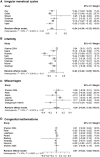The effects of bariatric surgery on periconception maternal health: a systematic review and meta-analysis
- PMID: 34387675
- PMCID: PMC8542997
- DOI: 10.1093/humupd/dmab022
The effects of bariatric surgery on periconception maternal health: a systematic review and meta-analysis
Abstract
Background: Worldwide, the prevalence of obesity in women of reproductive age is increasing. Bariatric surgery is currently viewed as the most effective, long-term solution for this problem. Preconception bariatric surgery can reduce the prevalence of obesity-related subfertility and adverse maternal, pregnancy and birth outcomes. Maternal health during the periconception period is crucial for optimal gametogenesis and for embryonic and fetal development which also affects health in the later lives of both mother and offspring. Although preconception bariatric surgery improves several pregnancy outcomes, it can also increase the prevalence of pregnancy complications due to excessive and rapid weight loss. This can lead to iatrogenic malnutrition with vitamin deficiencies and derangements in metabolic and endocrine homeostasis. Thus, bariatric surgery can greatly influence periconception maternal health with consequences for reproduction, pregnancy and health in later life. However, its influence on periconception maternal health itself has never been reviewed systematically.
Objective and rationale: The aim of this review was to investigate associations between bariatric surgery and determinants of periconception maternal health such as endocrine changes, fertility, vitamin status, irregular menstrual cycles, miscarriages and congenital malformations.
Search methods: Medline, Embase, PubMed, Web of Science, Google Scholar and the Cochrane databases were used for the literature search until 1 November 2020. The search strategy terms included, among others, bariatric surgery, hormones, fertility, malformations, miscarriages and vitamin status. We searched for human studies that were written in English. Abstracts, reviews, meta-analyses and conference papers were excluded. The ErasmusAGE score was used to assess the quality of the included studies.
Outcomes: A total of 51 articles were analysed. The mean quality score was 5 (range 2-8). After bariatric surgery, hormonal axes normalized and menstrual cycle regularity was restored, resulting in increased fertility. Overall, there were no short-term risks for reproductive outcomes such as the increased risk of miscarriages or congenital malformations. However, the risk of vitamin deficiencies was generally increased after bariatric surgery. A meta-analysis of 20 studies showed a significant decrease in infertility (risk difference (RD) -0.24, 95% confidence interval (CI) -0.42, -0.05) and menstrual cycle irregularities (RD -0.24, 95% CI -0.34, -0.15) with no difference in rates of miscarriage (RD 0.00, 95% CI -0.09, 0.10) and congenital malformations (RD 0.01, 95% CI -0.02, 0.03).
Wider implications: The current systematic review and meta-analysis show associations between bariatric surgery and periconception maternal health and underlines the need for providing and personalizing preconception care for women after bariatric surgery. We recommend preconception care including the recommendation of postponing pregnancy until weight loss has stabilized, irrespective of the surgery-to-pregnancy interval, and until vitamin status is normalized. Therefore, regular monitoring of vitamin status and vitamin supplementation to restore deficiencies is recommended. Furthermore, this systematic review emphasizes the need for a long-term follow-up research of these women from the periconception period onwards as well as their pregnancies and offspring, to further improve care and outcomes of these mothers and children.
Keywords: abortion; bariatric surgery; congenital malformations; female infertility; hormones; malnutrition; menstrual cycle; periconception; pregnancy; vitamins.
© The Author(s) 2021. Published by Oxford University Press on behalf of European Society of Human Reproduction and Embryology.
Figures





References
-
- Alatishe A, Ammori BJ, New JP, Syed AA.. Bariatric surgery in women of childbearing age. QJM 2013;106:717–720. - PubMed
-
- Al-Nimr RI, Hakeem R, Moreschi JM, Gallo S, McDermid JM, Pari-Keener M, Stahnke B, Papoutsakis C, Handu D, Cheng FW.. Effects of bariatric surgery on maternal and infant outcomes of pregnancy—an evidence analysis center systematic review. J Acad Nutr Diet 2019;119:1921–1943. - PubMed
Publication types
MeSH terms
LinkOut - more resources
Full Text Sources
Medical
Miscellaneous

